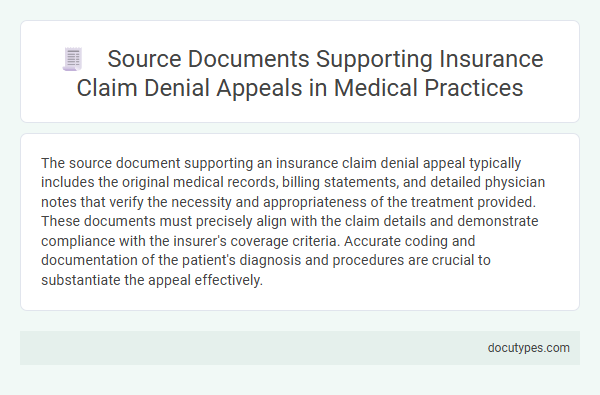The source document supporting an insurance claim denial appeal typically includes the original medical records, billing statements, and detailed physician notes that verify the necessity and appropriateness of the treatment provided. These documents must precisely align with the claim details and demonstrate compliance with the insurer's coverage criteria. Accurate coding and documentation of the patient's diagnosis and procedures are crucial to substantiate the appeal effectively.
Introduction to Source Documents in Insurance Claim Denials
Source documents play a critical role in supporting insurance claim denial appeals by providing essential evidence and information. These documents help verify the accuracy and validity of the original claim submission.
- Medical Records - Detailed patient history and treatment data that justify the necessity of medical services claimed.
- Physician Notes - Clinician's observations and rationale that support diagnosis and procedures billed.
- Billing Statements - Itemized charges and coding information that explain the financial aspects of the claim.
Thoroughly compiled source documents increase the likelihood of overturning insurance claim denials during the appeal process.
Importance of Proper Documentation for Appeals
| Source Document | Description | Role in Insurance Claim Denial Appeal |
|---|---|---|
| Medical Records | Detailed patient history, treatment notes, diagnostic results | Provide comprehensive evidence of medical necessity and services rendered |
| Physician's Letter or Appeal Letter | Formal explanation from the healthcare provider addressing the denial | Clarifies clinical rationale, counters payer's reasoning for denial |
| Billing and Coding Information | Itemized claim details including CPT, ICD-10, and HCPCS codes | Ensures accurate representation of procedures and diagnoses to support correct reimbursement |
| Test Results and Imaging Reports | Lab tests, radiology images, pathology reports | Substantiates diagnosis and medical decision-making relevant to the claim |
| Referral or Authorization Documents | Pre-authorization approvals or physician referrals | Validates that required prior permissions were obtained, addressing administrative denials |
| Discharge Summaries and Operative Reports | Summary of hospital stay and surgical procedures performed | Demonstrates treatment scope and supports claim accuracy |
| Importance of Proper Documentation | Accurate, organized, and comprehensive documentation is critical in appealing insurance denials. It strengthens the case by providing undeniable proof of necessity and compliance with payer requirements. Proper records reduce processing time and increase the likelihood of reversal of claim denial, securing appropriate reimbursement. | |
Patient Medical Records as Evidence
Patient medical records serve as a critical source document when appealing an insurance claim denial. These records provide detailed evidence of the patient's diagnosis, treatment, and care history that supports your appeal.
- Comprehensive Clinical Documentation - Medical records include physician notes, test results, and treatment plans to verify the necessity and appropriateness of the services billed.
- Proof of Patient Care - Records demonstrate that the patient received the services as documented, validating the claim's accuracy.
- Support for Medical Necessity - Detailed entries in medical records justify the medical procedures or treatments, countering common denial reasons related to coverage criteria.
Detailed Provider Notes and Progress Reports
Detailed provider notes and progress reports are critical source documents that support an insurance claim denial appeal. These records offer comprehensive evidence of the medical services provided, patient condition, and treatment rationale. You can use these documents to substantiate the necessity and accuracy of the submitted claims effectively.
Laboratory and Diagnostic Test Results
Laboratory and diagnostic test results serve as critical source documents when appealing an insurance claim denial. These documents provide objective evidence that supports the necessity and accuracy of the submitted medical services.
Your appeal should include detailed lab reports and diagnostic imaging results to substantiate the treatment or procedures performed. Insurance companies rely on these sources to verify clinical indications and justify claim approval.
Prior Authorization and Referral Documentation
Prior authorization and referral documentation are critical source documents supporting an insurance claim denial appeal. These documents verify that the necessary approvals were obtained before the medical service was provided, demonstrating compliance with the insurer's requirements. You must submit these records to strengthen your appeal and validate the legitimacy of the claim.
Explanation of Benefits (EOB) and Denial Letters
What source document supports an insurance claim denial appeal? The Explanation of Benefits (EOB) is a crucial document that details the insurer's decision and reasons for claim denial. Denial letters provide specific explanations and codes essential for crafting a successful appeal.
Corrected Claims and Resubmission Forms
Source documents play a crucial role in supporting an insurance claim denial appeal, especially when dealing with corrected claims and resubmission forms. Proper documentation increases the chances of overturning the denial and securing reimbursement.
- Corrected Claims - These documents reflect adjustments or corrections to the original claim, providing accurate information to resolve discrepancies.
- Resubmission Forms - Forms submitted after correcting errors on the initial claim, allowing for the reconsideration of the denied payment.
- Supporting Medical Records - Clinical notes and diagnostic reports that justify the claim and validate the medical necessity of services rendered.
Communication Logs With Insurance Companies
Communication logs with insurance companies serve as crucial source documents when supporting an insurance claim denial appeal. These records provide detailed insights into your interactions and the insurer's responses.
Accurate and thorough communication logs can demonstrate your persistent efforts to resolve disputes and clarify misunderstandings. They include phone call summaries, emails, and written correspondence that document the claim discussions. Maintaining organized records strengthens your appeal by providing verifiable evidence of any agreements or contested issues with the insurer.
What Source Document Supports an Insurance Claim Denial Appeal? Infographic

